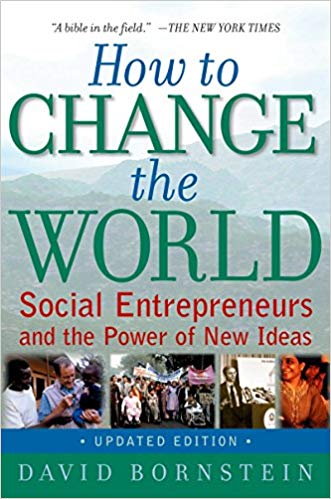Quoted as the bible in the field of social enterprise I was eager to discover what lay within my Kindle edition of “How to change the world: Social Entrepreneurs and the Power of New Ideas” by David Bornstein. I was certainly not disappointed, and more so, inspired. The book weaves the tale of Bill Drayton & Ashoka throughout its pages, exemplified by the examples of the Ashoka fellows themselves. And indeed it serves as a message of inspiration, of pioneers and role models of all walks of life that are leading the way into a burgeoning world of solutions based social innovation.
A few highlights of the book below:
Definition of social entrepreneur (Chapter 1)
“The designation “social entrepreneur” has gained popularity in recent years. America’s leading universities offer courses in social entrepreneurship. Journalists, philanthropists, and development workers frequently invoke the term. However, most of the attention focuses on how business and management skills can be applied to achieve social ends—for example, how nonprofits can operate for-profit ventures to generate revenues. While this is an important trend, this book looks at social entrepreneurs differently: It sees them as transformative forces: people with new ideas to address major problems who are relentless in the pursuit of their visions, people who simply will not take “no” for an answer, who will not give up until they have spread their ideas as far as they possibly can.”
“One of the most important things that can be done to improve the state of the world is to build a framework of social and economic supports to multiply the number and the effectiveness of the world’s social entrepreneurs.”
The Role of the Social Entrepreneur (Chapter 8)
“An idea is like a play. It needs a good producer and a good promoter even if it is a masterpiece. Otherwise the play may never open; or it may open but, for lack of an audience, close after a week. Similarly, an idea will not move from the fringes to the mainstream simply because it is good; it must be skillfully marketed before it will actually shift people’s perceptions and behavior.”
If ideas are to take root and spread, therefore, they need champions—obsessive people who have the skill, motivation, energy, and bullheadedness to do whatever is necessary to move them forward: to persuade, inspire, seduce, cajole, enlighten, touch hearts, alleviate fears, shift perceptions, articulate meanings and artfully maneuver them through systems.”
Four Practices of Innovative Organizations (Chapter 16)
- Institutionalize Listening
- Pay Attention to the Exceptional
- Design Real Solutions for Real People
- Focus on the Human Qualities
Six Qualities of Successful Social Entrepreneurs (Chapter 18)
- Willingness to Self-Correct
- Willingness to Share Credit
- Willingness to Break Free of Established Structures
- Willingness to Cross Disciplinary Boundaries
- Willingness to Work Quietly
- Strong Ethical Impetus
The Ashoka Fellows’ interviewed by David Bornstein are listed below. Their stories tell the tale of persistence and believing in their vision which shaped their lives in an unexpected journey. Most didn’t set out thinking they would achieve the results they have today. They were housewives, nurses, social workers, academics and doctors, yet each of them today exemplify the Ashoka fellow social entrepreneur definition.
Fábio Rosa, Brazil: Rural Electrification
Jeroo Billimoria, India: Child Protection
Vera Cordeiro, Brazil: Reforming Healthcare
J.B. Schramm, United States: College Access
Veronica Khosa, South Africa: Care for AIDS Patients
Javed Abidi, India: Disability Rights
James Grant, United States: The Child Survival Revolution















I appreciate you sharing this post.Really thank you! Keep writing.